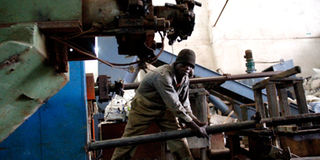When plastic is greener than trees

The process of manufacturing plastic poles from recycled plastics. Photo by Diana Ngila
Nairobi, Kenya
Many people thought Lorna Rutto was out of her mind when in 2009 she quit her well-paying job at a bank to pursue her teenage hobby - moulding plastic into ornaments and selling them to friends.
Using her personal savings and Sh15.1 million ($5,813) jackpot she had bagged that year in a business proposal writing competition dubbed Enablis Business Award, Ms Rutto establish a small factory to turn plastic into land-scaping products.
Ms Rutto, in March 2010, co-founded EcoPost Ltd, a firm which uses plastic waste to manufacture poles for fencing, landscaping, road signage and construction of small structures such as kennels and poultry sheds.
It was a plunge of faith for the Nakuru-born go-getter and after multiple trials and errors, mostly errors; the budding entrepreneur finally cracked the recipe for turning plastic trash into cash from the factory based at the Kariobangi Light Industry in Nairobi, Kenya’s capital.
“Quitting a well-paying white collar job was not welcomed by many; especially my dad, friends, relatives and those who knew me,” said Ms Rutto in an interview for SparkNews.
“When I was in school, I could heat plastic as we played around and soon, I realised that the molten plastic dropped in a small container took the shape of the container and when dried and removed, it made beautiful ornaments. I did this repeatedly and started selling to my friends.”
Little did Ms Rutto, who holds a degree in accounting from the Africa Nazarene University, know that her recycling venture would pioneer a new maxim: plastic is greener than trees.
It was always unlikely that plastic waste, considered an environmental hazard, could hold the key to protecting Kenya’s forests. “Recycling plastic to provide an alternative to timber thus preventing the cutting down of trees is greener,” says the 30 year old.
The twin advantages offered by recycling plastics is that this helps to tackle the challenge of solid waste as evidenced by plastic and polythene litter in many Kenyan towns and the plastic poles act as a substitute to lumber, thereby saving trees in a country where the forest cover is below the 10 per cent of land mass recommended by the United Nations.
EcoPost recycles 769.2kgs of plastic waste daily or 20 tonnes every month, churning out 100 poles every day which is equivalent to saving 10 mature trees. The plastic poles pioneered by Ms Rutto have grown beyond the domestic utility envisaged at inception of EcoPost to include fencing national parks and tourist resorts.
They are also used as support beams for houses, cow sheds and garages. Smaller profiles have also been used to make chicken and rabbit houses and kennels.
EcoPost lumber profiles are also used as pickets, roofing trusses, shipping pallets, decking boards, house road barriers, jetty support beams and for constructing outdoor furniture such as garden and picnic benches.
Some of the flagship projects where EcoPost plastic lumber products have been used include fencing the Aberdare National Park and the Giraffe Centre in Karen; and erecting road signage on the Thika Super Highway.
Kenya’s closed forest cover currently stands at about than 2.5 per cent according to statistics from the Kenya Forest Service (KFS) which is below the constitutional requirement of having at least 10 per cent of the land being under forest and tree cover by 2030.
EcoPost has saved the equivalent of 350 acres of forest - based on calculations by the Canadian Forestry Association – from last year’s production of over 24,000 plastic posts.
This means EcoPost has helped prevent 875 tonnes of carbon emissions given that studies by the Ottawa-based conservation agency shows that one acre of new forest can remove 2.5 tonnes of carbon emissions per year. The startling statistics make plastic an unlikely warrior in the campaign to save forests.
“EcoPost reduces hardwood and softwood tree felling by offering a viable replacement to many traditional timber applications,” said Ms Rutto. “Ours is one of the most environmentally conscious products on the market today.”
By withdrawing 240 tonnes of plastic waste from the environment every year and turning it into usable products, the fledgling factory also offers an alternative fencing material to wood and therefore reduce deforestation.
Since inception, EcoPost has withdrawn 1.5 million tonnes of plastic waste from Kenya’s streets, households and garbage yards. Its own internal research shows that Nairobi produces about 1,900 tonnes of waste daily, and 93 per cent of the garbage can either be recycled or is organic and thus can be utilised as manure.
It is estimated that plastic accounts for roughly a quarter of the total waste generated with most of it not making to Nairobi’s official dumpsite in Dandora.
Ms Rutto defied the challenges of working capital, erratic power supply, insecurity and a male dominated trade to build a profitable plastic recycling business which grossed sales of $165,000 (Shs430m) in 2012.
“The company is profitable and sustainable and our mission to create jobs for the marginalised people in the society has led to improved livelihoods of hundreds of youth and women,” says the plastic vendor.
EcoPost currently employs 40 permanent employees at its factory located along Baba Dogo Road in Nairobi’s Ruaraka district. The social enterprise provides a further 500 indirect jobs to those in the plastic value chain who collect, sort and clean plastic waste for reselling to the plant.




